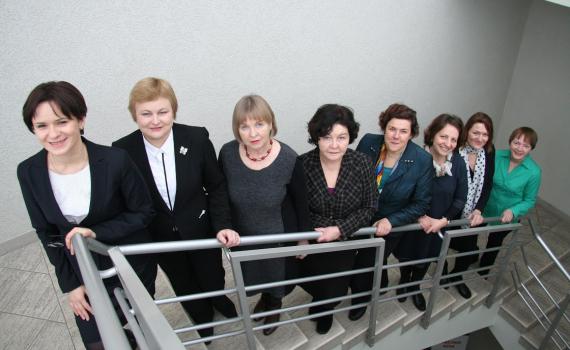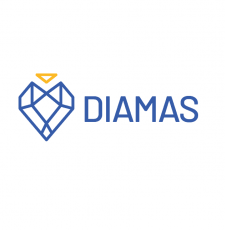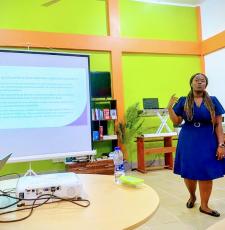
This month, in wintry Lithuania, I visited Emilija Banionyte, president of the Lithuanian Research Library Consortium (LMBA), and her team in their office in the Martynas Mažvydas National Library of Lithuania. Over a cup of hot coffee we discuss how LMBA ensures high usage of their licensed e-resources.
Jevgenija Sevcova, Manager of Databases at LMBA, explains that monitoring usage is essential in ensuring high usage, because it allows the consortium to identify and taregt institutions with low usage.
Once a year Jevgenija collates usage statistics of the consortium’s 55 member libraries, which include academic, research and special libraries, and some public libraries. She calculates cost per download as well as usage per student. For new members of the consortium, she also checks usage during the year.
When Jevgenija identifies institutions with low usage, she contacts their e-resources librarian to give support and advice, offer online product demonstrations, Skype calls, or on-site training workshops.
The consortium also provides members with information about how to obtain their own usage statistics, and on how to promote usage, both during trial periods and subscriptions. “Our goal is to teach each member library to look for their usage statistics and use this information,” says Jevgenija.
First the consortium trains the librarians to use the product. Then they suggest that librarians contact lecturers, who can recommend the resource to their students. LMBA has also developed a training course on information literacy that member libraries can adapt and use.
‘Talking to faculty and students goes a long way’
Emilija Banionyte adds that talking to people goes a long way in promoting resources, both at the trial stage and during a subscription.
“Yes, send emails to faculty and students; promote the resource on your website and social media; offer training sessions; hang up posters - do whatever you can to reach your target audience - but don’t forget to talk to people.”
“Pick out one interesting fact from a resource that you can mention. When you’re in the cafeteria and you bump into the dean of mathematics, ask him if he had a chance to look at your email about the maths database. People are overwhelmed by information nowadays. Telling a professor one interesting thing about a resource will motivate them to take a look.”
Our conversation moves to assessing user needs, and free trials. Ausra Vaskeviciene, Head of Administration at LMBA and EIFL Country Coordinator for Lithuania, says it’s OK to say “no” to some trials:
“Don’t pick up everything that is offered as a free trial. You need to examine the content and decide if it’s right for your institution before making the decision to subscribe.”
She advises that librarians should review the resource on offer and make a decision based on whether the subjects are taught at their institution. As a next step they can involve experts in determining the quality and depth of the content.
As an experienced member of the EIFL consortium network, Banionyte has been involved in consortium building and licensing workshops in other EIFL member countries, such as Azerbaijan, Kyrgyzstan, Cameroon and Algeria. She has also shared her experiences with colleagues in Thailand.
“It is important to share what we have learned. We have learned so much from EIFL, it has been such a big school for us, we’re glad to help and give something back to the community,” says Banionyte.
LMBA’s hard work over the last 15 years has paid off: they have been recognized by the Ministry of Science and Education, and also have full support from the Research Council of Lithuania.
SHARE / PRINT








